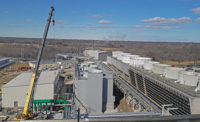
As the price of crude oil bottoms out at its lowest market value in more than four years, the bottom-line fuel costs of many construction-fleet managers are lighter. But equipment managers are taking this market depreciation with a grain of salt, knowing from experience that the price will bounce back sooner rather than later.
"It's very nice to have the dip right now," says Arne Ruud, corporate equipment manager for Broomfield, Colo.-based Guy F. Atkinson Construction LLC. "But there's no assurance it's going to go on for any length of time."
Both Brent and WTI benchmarks for crude oil have landed near $50 per barrel, down from roughly $100 per barrel a year ago. At the pump, gasoline in the U.S. has fallen to an average $2.21 per gallon, and diesel is at $3.14 per gallon, according to the Energy Information Administration.
When considering the long-term viability of equipment, managers like Ruud have to project costs such as fuel and future market value for their equipment, two factors influenced by crude-oil business. Price volatility in the fuel markets makes that job harder, they say.
Adoption of alternative fuels could suffer, too. For example, the U.S. Dept. of Energy lauds natural gas as an alternative fuel that burns cleaner than diesel and is mainly produced domestically. Early in his tenure, President Obama made it a point to promote the consumption of American fuel and praise natural gas for its economic and environmental benefits.
But the drastic drop in gasoline and diesel prices has equipment managers thinking there's no reason to change from those traditional fuels, according to Thad Pirtle, vice president and equipment manager at Traylor Bros., Evansville, Ind. Seeing low diesel prices definitely sways him to keep buying and maintaining diesel construction machines, he says.
"There's no way you could pencil it out and change something over to natural gas now, with the fuel prices the way they are," Pirtle says. "You'll have to see oil back over $100 dollars per barrel before you see natural gas being feasible."
This mentality pushes further into the future the likelihood of an industry transition to natural-gas machines, especially considering the process of planned acquisitions. "There's probably about a year's worth of analysis that they end up doing before they actually make the decision to do the purchasing," said Steve Tam, vice president of the commercial vehicle sector at ACT Research Co.
Swings in diesel prices also cause confusion for equipment managers like Pirtle, who has to estimate costs for bidding while the market is in constant flux.
"We're a bit confused on future estimates, future bidding," Pirtle says. "It's out there a year and a half, two years away before [projects] could start, so it's made it a little bit unstable."



Post a comment to this article
Report Abusive Comment